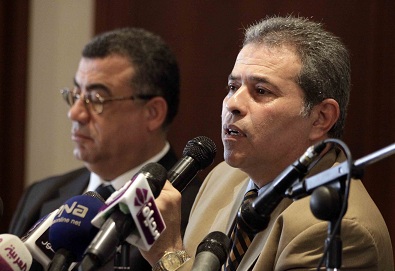By Alexander Dziadosz / Reuters
SUEZ: Mosaics lining the road to Suez glorify Egypt’s achievements in a 1973 war with Israel but, further on, toppled billboards, charred signposts and shattered glass stand as monuments to a more recent conflict.
The port city has jumped onto the world’s radar as the scene of clashes between government forces and protesters demanding the removal of President Hosni Mubarak, a veteran of the war with Israel who has ruled Egypt for three decades.
The capital Cairo was mostly calm on Thursday morning, but in Suez police fired rubber bullets, water cannon and teargas at hundreds of demonstrators, according to witnesses.
Online activists have started calling Suez Egypt’s Sidi Bouzid in a nod to the Tunisian city where protests began that toppled autocratic leader Zine El Abidine Ben Ali 13 days ago.
Suez residents say they share many of the problems voiced by the Tunisian protesters – high unemployment, rising prices, official corruption and widespread use of torture, and have taken inspiration from Tunisia’s uprising.
As in Tunisia, a large portrait of the country’s leader adorns a wall on the road into town. Mubarak’s face is beaming and benevolent, his arms outstretched toward his people.
“Our government is a dictatorship. A total dictatorship,” said Mohamed Fahim, a 29-year-old glass factory worker, as he stood near the charred skeleton of a car that he said was burned in the protests.
“It’s our right to choose our government ourselves. We have been living 29 years, my whole life, without being able to choose a president.”
“I’ve grown bald, and Mubarak has stayed Mubarak,” he said, rubbing his bare scalp.
A group of about 20 people quickly gathered around him, shouting out their complaints.
“We can’t find bread!” shouted one woman, who identified herself as a Christian.
Hundreds gathered outside a morgue in Suez on Wednesday demanding the body of one of three people killed in the first clashes on Tuesday. Police fired tear gas and rubber bullets and chased the demonstrators into side streets.
After nightfall, protesters set a government building on fire in Suez and tried to burn down a local office of Mubarak’s ruling National Democratic Party (NDP).
The fires were put out before they engulfed the buildings. The government raised security at key buildings and ordered that shops be closed after looting was reported.
“Choking”
The perception of government corruption is keen in the cities along the Suez Canal, a major source of government income.
People in Suez are well aware of the billions of dollars the canal earns for the country every year, and many complain the money does not translate into improved schools or more jobs.
Suez was caught up in three wars with Israel and people are also aware of the generous US military aid which is seen as a major support for Mubarak’s government. “The youth have no jobs!” shouted a 64-year-old man.
“The companies don’t have work for us!” yelled an 18-year-old girl wearing a headscarf.
One man beckoned for calm so a Reuters correspondent could write down their complaints.
“The basic problem of the people here is a social problem of the highest degree,” Munir Salaama Ismail, an unemployed 50-year-old, said. The answer is for the system to change, and the choice should be left to the people.”
Several people said firms in the city discriminated against locals, preferring to hire people from other governorates.
“In Suez we have, today, petrol companies…, we have factories, we have customs and we have the Suez Canal. And despite all of that, there is enormous unemployment in Suez,” said 40-year-old local lawyer Kamal Hassan.
A 55-year-old man in glasses and a sweater who declined to be identified sat at the restaurant he ran downtown. He said he was born in Suez in 1956, the year of Egypt’s Suez War with France, Britain and Israel.
He pulled an empty tear gas canister from the latest protests from his desk and held it up: “American,” he said, smiling. “The Americans and Israelis are experts in destruction.” He said the tipping point came for many people in late November when the NDP secured a crushing victory in parliamentary elections denounced by rights and opposition groups as blatantly rigged, something the government denied.
“The people,” he said, “are choking.” –Additional reporting by Yousri Mohamed

